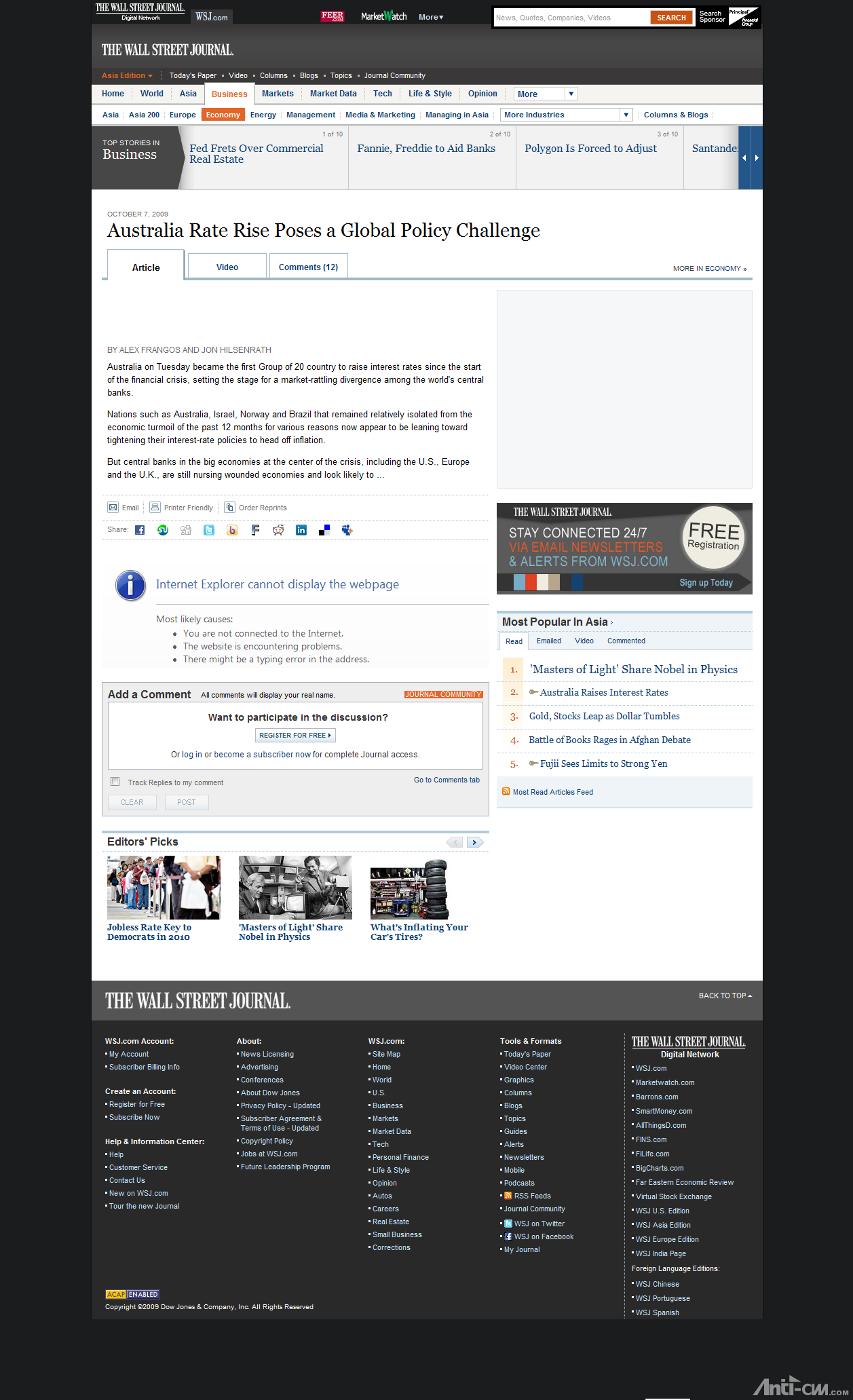|
|
本帖最后由 vivicat 于 2009-10-7 18:55 编辑
Australia Rate Rise Poses a Global Policy Challenge
http://online.wsj.com/article/SB125480012867566719.html?mod=WSJ_hpp_LEFTWhatsNewsCollection
By ALEX FRANGOS and JON HILSENRATH
Australia on Tuesday became the first Group of 20 country to raise interest rates since the start of the financial crisis, setting the stage for a market-rattling divergence among the world's central banks.
Nations such as Australia, Israel, Norway and Brazil that remained relatively isolated from the economic turmoil of the past 12 months for various reasons now appear to be leaning toward tightening their interest-rate policies to head off inflation.
But central banks in the big economies at the center of the crisis, including the U.S., Europe and the U.K., are still nursing wounded economies and look likely to keep interest rates extremely low for many months to come.
"Those economies that had bigger financial problems are going to feel the lasting impact of the downturn and those on the periphery are going to recover a bit quicker," said Joseph Lupton, an economist with J.P. Morgan Chase.
The divergence could cause new challenges for central banks around the world as they try to navigate a fragile and uneven global recovery. Countries experiencing faster recoveries and rising interest rates could see their currencies appreciate, something that could challenge their export sectors. Money flowing into early-recovery countries can also stoke dangerous bubbles in prices of assets such as stocks and real estate -- already a concern in parts of Asia.
Turbulence is showing up first in currency markets. One casualty is the British pound, which has been hamstrung by a weak economy and interest rates so low that they don't draw depositors. In the third quarter, the British pound lost 2.9% of its value against the U.S. dollar and gave up 6.9% against the euro. The pound nosedived Tuesday after news that U.K. industrial production declined in August.
The Reserve Bank of Australia raised its main interest-rate target one-quarter of a percentage point to 3.25%. Reserve Bank Governor Glenn Stevens indicated in a statement that the rate rise may be the first of a series. Australia avoided recession thanks to a relatively strong banking system, a quick fiscal stimulus and strong Chinese demand for its commodities.
"The risk of serious economic contraction in Australia now having passed, the board's view is that it is now prudent to begin gradually lessening the stimulus provided by monetary policy," Mr. Stevens said.
Investors pushed the Australian dollar higher Tuesday, attracted by the higher interest rate.

U.S. Federal Reserve officials have spoken extensively about their strategy for exiting from their low interest-rate policy in recent months, but have also emphasized their expectation that they won't need to execute the strategy and raise rates for a long time.
Asian currencies broadly rallied against the U.S. dollar on the Australian news. The dollar fell 1.28% against the Indonesian rupiah, which hit 9,420 per dollar, the rupiah's strongest level for the year.
Several countries have intervened in foreign-exchange markets recently to prevent currencies from appreciating too much against the dollar. In the process, they have accumulated larger dollar reserves.
Asian central banks have a delicate balance to achieve in the coming months. Most have traditionally waited for the Federal Reserve to raise rates before taking action. This time the Asia-Pacific region is leading the world economic recovery. Waiting for the Fed -- which isn't expected to raise its target until the third quarter of 2010 -- risks stoking inflation and bigger rate increases later. But acting ahead of the Fed could mean unwanted upward pressure on their currencies and even more reserves.
Israel, which also remained isolated from the global financial turmoil of the past 12 months, had an interest-rate increase in August and could see another at the Bank of Israel's next policy meeting later this month.
Another country on many lists for a rate increase is South Korea. It has one of the fastest-rebounding economies in the world and has already seen a sharp upturn in property prices and the value of its currency, the won. The Bank of Korea's interest-rate board meets Friday. It is expected to hold rates steady at that meeting, citing still-fragile economic conditions. But a debate has developed among policy makers in Korea over when to move higher, and the Australian announcement could give those supporting a rate increase political cover.
Sanjay Mathur, economist at RBS in Singapore, used Australia's move as a cue to move up his forecast for Korea to raise its target interest rate later this year, rather than in the first quarter of 2010. Other countries expected to tighten monetary policy beginning early next year include Indonesia, Taiwan, India and China.
Norway -- like Australia, a resource-rich country that has broadly avoided recession -- is also expected to tighten soon. The world's fifth-biggest oil exporter and third-biggest gas exporter, Norway has benefited from a revival in the commodity sector.
At its Sept. 23 meeting, Norges Bank left its key rate unchanged at 1.25% but said it considered an increase, which market watchers interpreted as a signal that it will raise rates in October.
—James Glynn, Geoffrey T. Smith and Neil Shah contributed to this article.

|
Challenge, Policy, rate, Rise, 华尔街日报, Challenge, Policy, rate, Rise, 华尔街日报, Challenge, Policy, rate, Rise, 华尔街日报
评分
-
1
查看全部评分
-
|